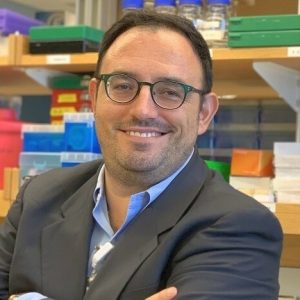 Close to 10% of the over 20,000 premature children every year develop airway disorders that often require laryngotracheal reconstruction using cartilage harvested from the rib cage, but this approach is invasive and cannot be applied to younger children, which motivates an urgent need for new, improved technology. The National Heart, Lung, and Blood Institute funded an innovative approach to produce functional cartilage for grafting using decellularized meniscus from a cadaveric donor where selective digestion of tissue components creates channels for recellularization with autologous cell sources obtained by a minimally invasive biopsy. The in vitro and in vivo proposed studies are aimed at defining new, less invasive, and more effective therapeutic options for laryngotracheal reconstruction.
Close to 10% of the over 20,000 premature children every year develop airway disorders that often require laryngotracheal reconstruction using cartilage harvested from the rib cage, but this approach is invasive and cannot be applied to younger children, which motivates an urgent need for new, improved technology. The National Heart, Lung, and Blood Institute funded an innovative approach to produce functional cartilage for grafting using decellularized meniscus from a cadaveric donor where selective digestion of tissue components creates channels for recellularization with autologous cell sources obtained by a minimally invasive biopsy. The in vitro and in vivo proposed studies are aimed at defining new, less invasive, and more effective therapeutic options for laryngotracheal reconstruction.
McGowan Institute for Regenerative Medicine affiliated faculty member Riccardo Gottardi, PhD (pictured), is an Assistant Professor of Pediatrics and of Bioengineering at the University of Pennsylvania and the leader of the Bioengineering and Biomaterials Laboratory at the Children’s Hospital of Philadelphia. Dr. Gottardi works closely with clinicians to develop engineering solutions for pediatric airway disorders based on translational tissue engineering and on novel preventative drug delivery approaches with accelerated pathway to the clinic. His lab investigates the basic cellular, molecular, and microbiological mechanisms as well as the genetic aspects of ear, nose, and throat damage and healing, and combines the development of organ-on-chip and animal models of cartilage, vocal folds, and craniofacial tissues to study growth, disease, and repair. He is the principal investigator on the latest 1-year project entitled, “Decellularized Cartilage and Progenitor Cells for Laryngotracheal Reconstruction.” Work began on September 22, 2022.
The abstract of this project follows:
Severe subglottic stenosis, the narrowing of the airway just below the vocal folds, develops as a response to intubation in close to 10% of the > 20,000 premature births per year in the United States. Severe cases require laryngotracheal reconstruction (LTR), in which surgeons split the cricoid and add a piece of autologous patient-derived cartilage to expand the airway and restore proper airflow. However, in children, the success rate is as low as 50% with a high incidence of restenosis requiring revision surgery. Graft failure is tied directly to the lack of sufficiently sized autologous cartilage in the child, and tissue engineering has been proposed to develop alterative grafting options for pediatric LTR. Some approaches, including some of our previous work, have been effective in producing functional cartilage, but the overall timeframe required for the construct to match the mechanical properties of native cartilage (>24 weeks) is not compatible with clinical translation (<8 weeks). Furthermore, current cell sources such as expanded autologous chondrocytes and mesenchymal stem cells frequently result in hypertrophic and calcified tissue. Our objective is to engineer a new type of cartilage implant that is populated with patients’ cells, mechanically viable and suitable for LTR within a clinically relevant timeframe. Our approach is to exploit the blood vessels and elastin fibers that are uniquely present in the fibro-elastic cartilage of the meniscus to form microchannels for effective recellularization after enzymatic decellularization. Our patent-pending Meniscal Decellularized scaffold (MEND) technology can indeed be easily recellularized and has mechanical properties of the same order as native tracheal cartilage. Furthermore, cartilage progenitor cells have been proposed as a rapidly proliferating, highly chondrogenic cell source. To harness these cells, we have developed a minimally invasive biopsy procedure to harvest ear Cartilage Progenitor Cells (eCPCs). Our overarching hypothesis is that MEND and eCPCs can be combined to create cartilage implants with suitable mechanical strength, dimensions, and phenotypic stability for personalized, minimally invasive LTR. We propose to use MEND recellularized with eCPCs to engineer cartilage with tissue properties matching those of native cartilage. We will then validate the MEND-engineered cartilage in a miniature pig LTR model. We expect that our findings will provide strong pre-clinical evidence of functional laryngotracheal cartilage repair by our innovative eCPC-MEND technology and will thereby prompt follow up, long-term studies to eventually apply this technology to restore children’s airway.
Congratulations, Dr. Gottardi!
Read more…
NIH Reporter: Decellularized Cartilage and Progenitor Cells for Laryngotracheal Reconstruction
